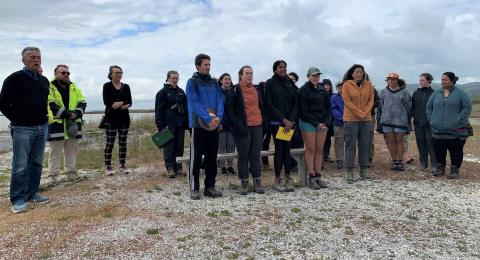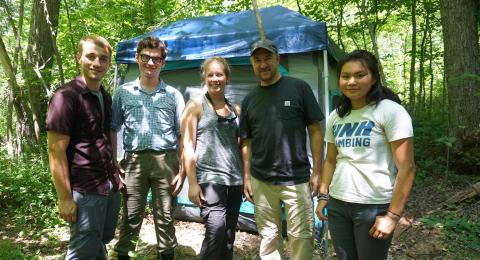The Forestry minor at UNH builds your practical skills in forest management and conservation. It enhances your career prospects in environmental science, wildlife management and sustainable industries by providing specialized knowledge in ecosystem dynamics, resource management and conservation practices crucial for today's environmental challenges.
What is forestry?
Forestry is the art and science of managing and conserving forests.The forestry minor introduces you to the sustainable management of forests for productivity, health and biodiversity. You’ll learn about forest ecology, inventory and modeling, and have the opportunity to study the economics and management of forests, watershed water quality, geographic information systems and remote sensing. Combine this minor with a major such as business, environmental studies, biology, wildlife and conservation biology, or recreation management and administration to prepare for forestry-related careers in business, industry or government.
Why study forestry at UNH?
Located in second-most forested state in the U.S., UNH is the perfect location to study forestry. Our nationally accredited program emphasizes hands-on experience through intensive lab and fieldwork in university woodlands and in the White Mountain National Forest. You’ll be encouraged to participate in faculty research projects and UNH’s EcoQuest study-abroad program in New Zealand.You’ll also have the opportunity to join the UNH Forestry Club, Xi Sigma Pi Natural Resources Honor Society and the UNH Woodsmen Team.
Potential career areas
- Business management
- Education and outreach
- Forest and conservation management
- Forestry consulting
- Forestry operations
- Geospatial analysis
- Outdoor recreation management
- Research
- State or national parks management
- Surveying
- Urban forestry
- Wildlife management
Curriculum & Requirements
The minor in Forestry serves as a concentrated study, beyond a student's primary major, that allows students to explore their interest in forest ecology and management, and to build skills that can help launch a career in forest conservation.
- Academic policies related to Minors.
- The minor consists of completing five courses (20 credits) with a grade of C- or better.
- Pass/Fail courses may not be used for the minor.
- Up to 8 credits can be used to satisfy both major and minor requirements.
| Code | Title | Credits |
|---|---|---|
| Required Courses | ||
| NR 425 | Field Dendrology | 4 |
| NR 527 | Forest Ecology | 4 |
| Select one course from the following: | 4 | |
NR 749 | Forest Inventory and Modeling | |
NR 757 | Remote Sensing of the Environment | |
| Select one course from the following: | 4 | |
NR 729 | Silviculture | |
NR 745 | Forest Management | |
| Electives | ||
| Select one of the following or one of the alternative courses from above: | 4 | |
NR 506 | Forest Entomology | |
NR 564 | Urban Forestry and Arboriculture | |
NR 643 | Economics of Forestry | |
NR 658 | Introduction to Geographic Information Systems | |
NR 703 | Watershed Water Quality Management | |
NR 734 | Tropical Ecology | |
NR 765 | Community Ecology | |
NR 781 | Agroforestry | |
NR 782 | Forest Health in a Changing World | |
| Total Credits | 20 | |











